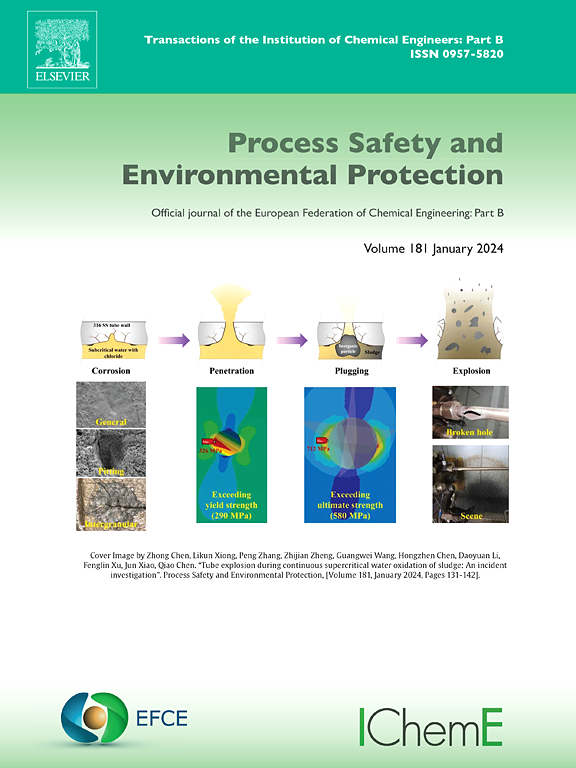面向分散过程监控的多子空间质量感知慢特征提取
IF 6.9
2区 环境科学与生态学
Q1 ENGINEERING, CHEMICAL
引用次数: 0
摘要
对过程安全和产品质量的关注推动了复杂数据驱动方法的采用,多元统计过程监控(MSPM)成为过程工业的基石。然而,随着这些行业的扩展和生成越来越复杂的数据集,传统的MSPM框架往往无法捕获复杂的过程动态,使故障检测和诊断复杂化。此外,大多数MSPM方法没有考虑闭环控制器对异常条件的调节作用,经常导致将操作转换错误地分类为故障。为了解决这些挑战,本文提出了一种多子空间质量感知慢特征分析(MQASFA)方法,用于并发监测操作偏差和异常行为。MQASFA框架采用多子空间策略,使用对称Kullback-Leibler散度从概率的角度聚合相关变量。采用分阶聚类算法对变量块进行整合,降低了计算复杂度和冗余度,同时保留了重要的局部进程信息。随后,在每个子空间中部署一个具有质量意识的慢特性分析子模型,用于分散的、以质量为中心的监控。为了区分常规操作变化和重大异常,引入了基于支持向量数据描述的新型静态和动态度量。通过田纳西州伊士曼工艺和废水处理基准的应用,验证了所提出方法的有效性。本文章由计算机程序翻译,如有差异,请以英文原文为准。
Multi-subspace quality-aware slow feature extraction for decentralized process monitoring
The focus on process safety and product quality has propelled the adoption of sophisticated data-driven methodologies, with multivariate statistical process monitoring (MSPM) becoming a cornerstone in process industries. However, as these industries expand and generate increasingly complex datasets, conventional MSPM frameworks often fail to capture intricate process dynamics, complicating fault detection and diagnosis. Additionally, most MSPM approaches do not consider the moderating influence of closed-loop controllers on abnormal conditions, frequently leading to misclassification of operational transitions as faults. To address these challenges, this paper presents a Multi-Subspace Quality-Aware Slow Feature Analysis (MQASFA) method for concurrently monitoring operational deviations and anomalous behavior. The MQASFA framework employs a multi-subspace strategy using symmetric Kullback-Leibler divergence to aggregate correlated variables from a probabilistic standpoint. A divisive hierarchical clustering algorithm is applied to integrate variable blocks, reducing computational complexity and redundancy while preserving essential local process information. A quality-aware slow feature analysis submodel is subsequently deployed for decentralized, quality-focused monitoring within each subspace. To differentiate routine operational variations from significant anomalies, novel static and dynamic metrics derived from Support Vector Data Description are introduced. The efficacy of the proposed methodology is validated through applications to the Tennessee Eastman process and a wastewater treatment benchmark.
求助全文
通过发布文献求助,成功后即可免费获取论文全文。
去求助
来源期刊

Process Safety and Environmental Protection
环境科学-工程:化工
CiteScore
11.40
自引率
15.40%
发文量
929
审稿时长
8.0 months
期刊介绍:
The Process Safety and Environmental Protection (PSEP) journal is a leading international publication that focuses on the publication of high-quality, original research papers in the field of engineering, specifically those related to the safety of industrial processes and environmental protection. The journal encourages submissions that present new developments in safety and environmental aspects, particularly those that show how research findings can be applied in process engineering design and practice.
PSEP is particularly interested in research that brings fresh perspectives to established engineering principles, identifies unsolved problems, or suggests directions for future research. The journal also values contributions that push the boundaries of traditional engineering and welcomes multidisciplinary papers.
PSEP's articles are abstracted and indexed by a range of databases and services, which helps to ensure that the journal's research is accessible and recognized in the academic and professional communities. These databases include ANTE, Chemical Abstracts, Chemical Hazards in Industry, Current Contents, Elsevier Engineering Information database, Pascal Francis, Web of Science, Scopus, Engineering Information Database EnCompass LIT (Elsevier), and INSPEC. This wide coverage facilitates the dissemination of the journal's content to a global audience interested in process safety and environmental engineering.
 求助内容:
求助内容: 应助结果提醒方式:
应助结果提醒方式:


